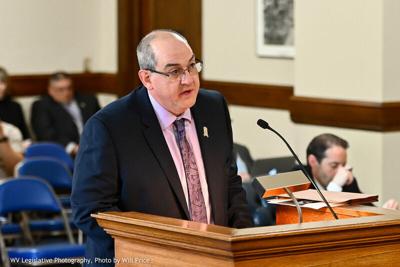Plaintiffs who have been inmates at Southern Regional Jail and Correctional Facility in Raleigh County and former and current West Virginia corrections officials have reached an agreement in a case alleging inhumane conditions at the jail.
The parties believe the agreement will require a limited-fund class action and federal court approval, according to a filing Tuesday noting the agreement.
The agreement in the U.S. District Court for the Southern District of West Virginia, signed by District Judge Frank Volk, comes 16 months after the class-action lawsuit was filed in July 2022.
The defendants included in the agreement are state Division of Corrections and Rehabilitation Commissioner William Marshall, former DCR commissioner Betsy Jividen, former Department of Homeland Security secretary Jeff Sandy, former interim DCR commissioner and executive officer Brad Douglas and former Southern Regional Jail superintendent Michael Francis.
The resolution doesn‚Äôt include nonstate government defendants in the case ‚ÄĒ county commissions that house inmates at the jail and companies that have been facility medical providers, PrimeCare Medical of West Virginia Inc. and Pittsburgh-based correctional health care firm Wexford Health Sources Inc., according to Tuesday‚Äôs filing. The defendant county commissions are those serving Raleigh, Fayette, Greenbrier, Mercer, Monroe, Summers and Wyoming counties.
A status conference has been scheduled for 12:30 p.m. Nov. 9 in Beckley.
Terms of the agreement were not disclosed.
The plaintiffs alleged pervasive overcrowding, faulty plumbing resulting in a lack of running water and limited or no access to drinking water, black mold in inmate cells and showers, and rodent and insect infestations at the Raleigh County jail.
The agreement was filed eight days after Magistrate Judge Omar Aboulhosn found that the defendants intentionally destroyed evidence in the case that had been requested by the plaintiffs. Aboulhosn found the officials‚Äô efforts constituted ‚Äúa dereliction of duty‚ÄĚ and asked that a copy of his order be distributed to the U.S. Attorney to consider whether an investigation of the DCR, an agency within the Department of Homeland Security, was warranted.
The Justice administration said last week Douglas, who had most recently served as DCR executive officer, and Phil Sword, who was DHS general counsel and an assistant attorney general in the Attorney General’s Office, had been terminated following Aboulhosn’s order.
In a phone interview last week, Gov. Jim Justice’s chief of staff, Brian Abraham, indicated that the terminations were to hold them accountable for the state failing to preserve emails requested by the plaintiffs in discovery, an information-sharing process in legal cases.
Abraham denied Aboulhosn’s conclusion that state officials destroyed paper evidence and asserted that officials already provided information that Douglas failed to confirm had been preserved in hearing testimony blasted by Aboulhosn.
Aboulhosn cited an affidavit from Southern Regional inmate Charles Mann reporting that the jail’s management directed inmates, including him, to move files in the gym that were subpoenaed in a federal investigation multiple times so they could not be found during the investigation. The files allegedly showed incident reports, correctional officer excessive force reports, and procedure files.
The files were being moved, burned and shredded and had been for months, Mann said in the March 2023 affidavit.
Deaths have become more frequent at Southern Regional in recent years, fueling inmate civil rights concerns.
Just shy of 20% of 177 inmate deaths in the state’s regional jails from 2009 to May 2023 occurred at Southern Regional, including 19 deaths from 2021 to May 2023, according to data obtained by the Gazette-Mail through a Freedom of Information Act request.
The lawsuit cited a 2020 Division of Corrections and Rehabilitation annual report that indicated an average 12-month daily population of 640 in the facility with a designed capacity of 468. The jail’s average daily population for fiscal year 2021 was even greater at 717.
Former and current correctional officers recalled as many as 12 to 16 inmates placed in a single 120-square foot suicide cell at once and left there for days at Southern Regional Jail in testimony filed in the lawsuit.
Testifying as a current Southern Regional correctional officer and shift supervisor in written testimony in the class-action lawsuit filed in September, Troy Carter said he was aware of ‚Äúnumerous‚ÄĚ incidents there in which an inmate was stabbed or beaten by another inmate because his cell door was broken or didn‚Äôt lock.
Carter testified 75% of the jail’s cell doors were broken or didn’t lock, which he called a major safety concern that violated federal rules. Carter and two former Southern Regional correctional officers said in written testimony that inmates there had been attacked and injured by other inmates because they were living in a dayroom unprotected by a locked cell.
Sandy had reported over $200 million in deferred maintenance costs for his agency to state leaders while he was DHS secretary.
Sandy estimated a $27 million cost for lock replacements ‚ÄĒ just shy of the $28.3 million that had been left over in CARES Act funding seven months ago.
The plaintiffs cited a February 2023 Gazette-Mail report highlighting a transfer of roughly $28.3 million that had been allotted in federal COVID relief funding into a Governor’s Office-controlled discretionary account at the federal Sept. 30, 2022, deadline to spend that funding on COVID relief.
Governor’s Office staff members have said the state used the $28.3 million to reimburse itself for previously incurred corrections expenses totaling that amount.
Rather than reimbursing the DCR or Department of Homeland Security with the transferred $28.3 million, the Justice administration has sat on most of it. The fund still contained $17.5 million as of last month, according to the state Auditor’s Office.
The Justice administration spent $10 million of the $28.3 million on a new baseball stadium for Marshall University in October 2022, making that payment five days after the $28.3 million was transferred to the Governor’s Office-controlled account.
The plaintiffs’ amended complaint noted those financial maneuvers.











